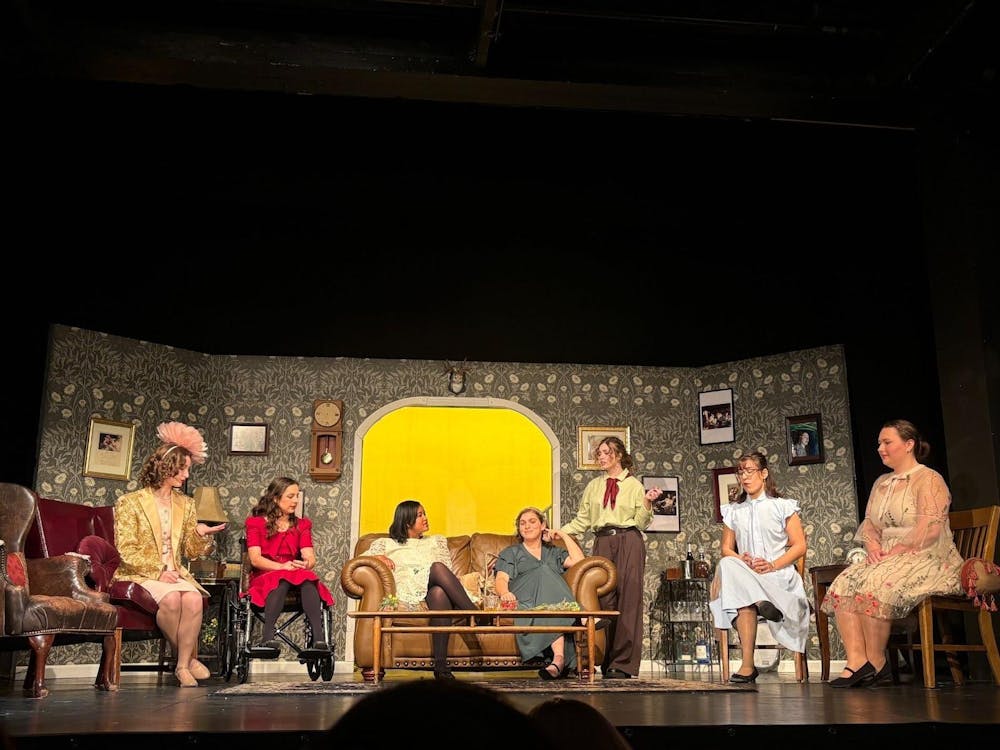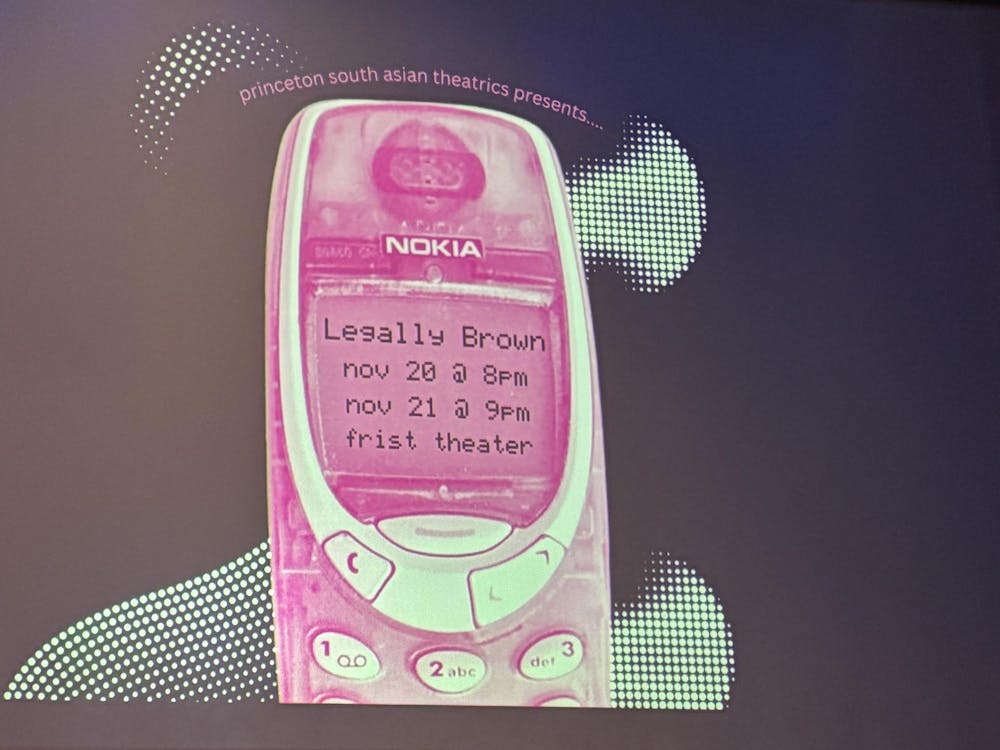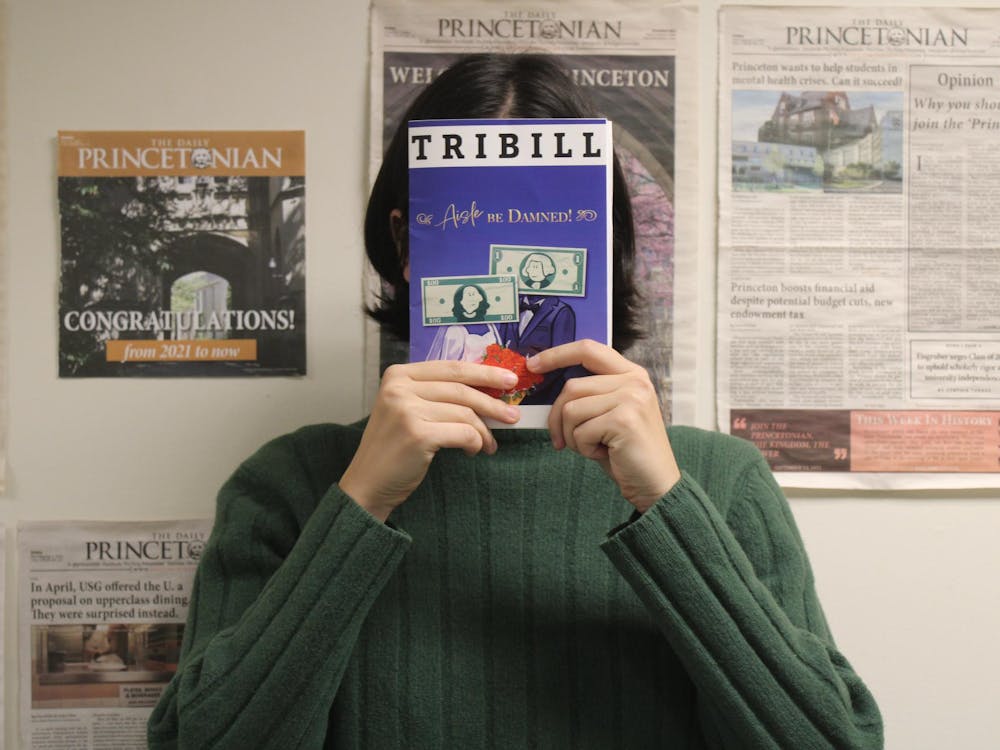Even before 'Elektra' begins, you are meant to confront grief in unexpected, disturbing ways. Before you can find your seat, the Greek chorus, dressed as steampunk maids resembling characters from the video game “Bioshock,” demand that you cut off a lock of your hair to dedicate to the late King Agamemnon. The alternative is to write a message on a sticky note, which I think is what most people ended up doing.
Entering Matthews Acting Studio, you are presented with a scene straight out of David Lynch’s Blue Velvet, with dim lights and the drone of an emergency exit message muffled behind the sorrowful, nightclub voice of Clytemnestra (Michaela Milgrom ’16) singing Procul Harum's 1967 classic rock song "A Whiter Shade of Pale" on the balcony. The title character, Elektra (Evelyn Giovine ’16) is bound and gagged, struggling against ropes, writhing as she observes Aegisthus (Matthew Barouch ’16) kissing and getting physical with her mother, Clytemnestra. The whole effect is jarring and fascinating, the looping of classic rock mesmerizing as you experience the haunting Lynch-like dream.
A senior thesis performance with edge, this anachronistic, noir/horror-inspired take on Sophocles’ ‘Elektra’ is striking, especially in that it gives the revenge tragedy an entirely different lens with which to frame the story. The set design and stunts find innovative ways to express the moods of the characters. Giant roles of white paper cover the stage floor, the perfect canvas for Elektra’s charcoal-and-fury-filled meltdowns. Aegisthus drunkenly sings Queen’s “We Are the Champions” while sipping and spitting from a champagne bottle. More innovations delight — like Orestes (Robert Keown '17) emerging with his arms soaked in ‘blood’ and the presentation of Orestes’ fake ashes — in a coffee can.
In the starring role, Giovine is fittingly electric. As Elektra, she channels madness and fury while simultaneously possessing the ability to unexpectedly shift into deadpan speech. There’s a moment, after one of her long temper tantrums, when Elektra says, “You’re out of control” to Clytemnestra and the ensuing dramatic irony caused several members of the audience to chuckle.
Keown plays the hero Orestes with great resolve, the weight of his family on his shoulders. Portrayed as reluctant to enact revenge, he ultimately succumbs to his sister’s demands and lust, but not without retaining his ambivalence. As the ‘Old Man,’ Changshuo Liu '19 provides refreshing comic relief sporting a cane and mechanic’s jumpsuit. While Aegisthus is seen only briefly, Barouch effectively plays the role up to maximum chauvinist potential.
When it comes to Milgrom’s Clytemnestra, her performance successfully adds weight and moral dimension to the character. Though Clytemnestra is initially framed as the evil murderess by Elektra, Milgrom effectively delivers Clytemnestra's passionate speech explaining that she killed Agamemnon for sacrificing their daughter Iphigenia, thus undermining Elektra’s credibility and fully developing the moral gray area that makes this play so enduring.
Chrysothemis (Alex Vogelsang '18) channels a Southern debutante affect that suits the character, serving as a foil for the demented Elektra while showing flashes of the same raw emotion. Moreover, in this modern take, the chorus players (Dylan Blau Edelstein ’17) and Kasia Kalinowska ’19) both participate in the scenes and strangely feel as if they are sometimes Elektra's hallucinations, and the innovation admirably updates the ancient chorus for an audience experience with plot twists that reveal things are not always what they seem.

‘Elektra’ is not for everyone. It’s definitely a little bit more than R-rated, and its edgy take on incest, passion and grief is in line with the content of the play but may clash with more conservative sensibilities.
Moreover, the performances’ emotions run high and extravagant; this is a fancy way of saying there’s a lot of shouting in this play, and I wonder what the production might have been like if the actors were directed to perform with more restraint.
In terms of theme, the play concerns the mourning of Agamemnon, the mourning of Orestes, the mourning of Clytemnestra’s daughter Iphigenia, but the presence that overshadows this work is that of the late Program in Theater director Tim Vasen. Originally scheduled to direct this show, Vasen's passing led to Alexandru Mihail taking over directing duties. One of Vasen’s many passions was Greek drama, and in some ways this play feels like a novel completed and published posthumously, a fitting tribute to Vasen’s theatrical acumen and genius.
During one of her monologues, Clytemnestra says, “Perfect yourself before you blame others." The idea of assigning blame permeates the play, a motif heightened through the dramatic three-minute long stare shared between Elektra and Orestes that closes the production. The play's final moments bring it full circle — back to the cinematic, harrowing vision introduced in its haunting prelude.

4.5/5 Paws
Pros: powerful performances, ingenious direction and set design.
Cons: too edgy for some, perhaps too loud for others.







